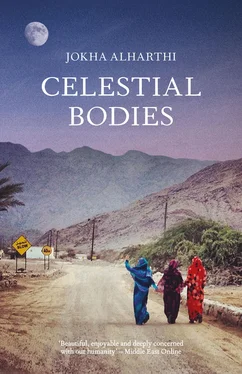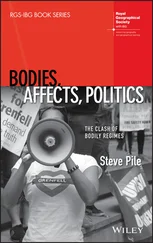When the voice of the muezzin’s wife sang out, asking permission to come in, Salima hurried over to the open end of the reception room to meet her. At the same moment Zarifa emerged from the kitchen, which sat at the eastern corner of the courtyard in front of the house. Well, just look there! Salima’s legs are all better now, she can get up after all! she muttered loudly.
As Salima and the muezzin’s wife were greeting each other with obvious warmth, Zarifa’s loud hoarse voice sailed across the courtyard. The proverb-maker says: Morning or sunset, the beloved’s loved ever, but no welcome for the other, though proud and clever! She slapped her palm across her thigh and disappeared back into the kitchen.
Years ago the muezzin’s wife had come here from the town of Sama’il deep in the interior. Her own name was long forgotten since people had started calling her simply Muezzin-Wife. She and Salima launched themselves into a conversation that meandered and branched off into new tales, becoming ever more engrossing. Mayya stared at her nursing baby, her gaze silent and neutral.
Asma came in and sat down next to them. Listen, Mama! You have to make up this mixture for Mayya, just like the writer of this book Fruit for the Wayfarer said to do it. It’s got—
With a laugh Salima interrupted her. I don’t need any of your medicine books or those fancy dukhtoors teaching me what to make for my daughter. I brought up five living healthy souls, I did, and no one had to teach me how to do it. Those books will make your eyes pop out if you keep on reading them all the time. Come on, time for some coffee.
Look here, Mayya, said Asma. Modern medicine has established that dates are very good for a woman who has just given birth, and that was revealed in the Qur’an, too, after all, when Our Lady Maryam shook the palm tree and the dates fell down on her, and all around. She was in childbirth and in the Qur’an she was told, ‘if you shake the palm-tree trunk, towards you, it will bring you fresh ripe dates.’
Asma pronounced the word rutban in the classical way with its proper grammatical ending, hoping to dazzle Muezzin-Wife. But her mother’s firm hand around her arm yanked her away from her sister. Leave Mayya alone! She’ll eat on her own, by herself, when she wants to.
Why? asked Asma. Muezzin-Wife had an answer ready and she intoned it half under her breath. Because she is unclean inside. It is not proper for people to share her food. It is not permitted to eat from the same platter as an unclean woman.
Asma was annoyed. She was certain there was a hadith on this. She was convinced that God’s Messenger had said or shown somehow, in his own life, in what he told others, that a woman could eat and drink in company no matter what her condition. But in the presence of the muezzin’s wife she could not say anything, since the woman might think she was criticizing the Faith.
Zarifa came in to pour their coffee. She had always been the only woman of slave origins who ate from the same platter of food as the free women did. In fact, she’d given herself this privilege, imposing it on the ladies. But no one had ever objected, or started an argument with her over it. Now she began tossing chunks of the sweet oily delicacy that marked special occasions into her mouth, licking the oil left on her fingers with obvious pleasure.
Take it easy on yourself, Zarifa, Muezzin-Wife muttered. Remember about your diabetes. Your body — ma sha’ allah! — I wouldn’t say it’s exactly scrawny.
Zarifa cackled. What should scare me about being sugar-sick? Death comes when it comes, milady dear. No need for us to torture ourselves over it. And my body — ma sha’ allah! — is just fine. May the envious one go blind! I don’t listen to what those dukhtoors say. Sukkari, they say! Well, diabetes or no diabetes, I don’t mind them. Anyway, as the proverb-maker says: The flesh of youth? Old age devours it! She refilled her cup and sipped, her bulging fingers slipping around the cup.
Muezzin-Wife smiled thinly. Seek God’s forgiveness, Zarifa! The flesh of youth is devoured by old age? How much older, Zarifa? May God’s forgiveness always be there, since humans have such tall hopes! You’re at least fifty now.
Zarifa shrugged. So, what’s fifty, ya habba! Fifty is the summit of youthfulness, I say. And my son’s only just had a child. I didn’t become a grandmother before I was even forty, like some folks do.
Salima acted as though she hadn’t been paying attention and didn’t understand the gist of the remark that Zarifa had flung her way. She busied herself eating orange sections. It did not bother her that she had become a grandmother while still in her early forties, and she made a little show of her indifference to Zarifa’s comments. But Muezzin-Wife persisted. True, Zarifa, wAllahi, you aren’t really elderly, but you were in too much of a hurry anyway. You married off your boy so young.
Zarifa sat up straighter, swallowed the sweet and looked the muezzin’s wife straight in the eye. Mercy be! she said. I didn’t realise Shanna was such a viper. Her father had just died, and one shows mercy to the dead. Her poor miserable mother, Masouda, went mad. The girl is a relative, I told myself. There’s a connection from the womb, God forbid we abandon her. And I ask you, anyway, was it better to marry off Sanjar or to leave him to the mercy of all those men who know exactly what they’re after?
Salima gave her a sharp look and Muezzin-Wife shook her head hard. Seek God’s forgiveness for such talk, she exclaimed hastily.
More women’s voices could be heard, asking leave to enter. Salima gave Asma a sign. She got to her feet sluggishly. Asma was not at all convinced that she had no right, as an unmarried girl, to sit with the married women and listen to their conversations, especially since the ‘experience of life’ that this custom of theirs tried so hard to keep from her was something she could obtain easily enough from books. Aah, the books! The thought of the enormous pleasure of books quickened Asma’s pace. It was a good moment to lose herself in their joys.
As much as I have travelled, I still like getting the seat by the window. I like to stare down at one city after another, dwindling and then vanishing. Papa, London said once, you travel an awful lot. I did not say to her that when we are away from home, in new and strange places, we get to know ourselves better. And that is exactly the way it is with love. London does not know much about strange places or being far from home but she certainly knows about love. Her stubborn endurance under her mother’s blows allured and pained me in equal measure, until I cracked the whip myself and married her to him.
What do you really know about love? she demanded of her mother. From the very first day you opened your eyes on life, you never saw anyone, until you saw my father. How old were you when they married you to him?
She thought I was out of the house at the time but I was there and I heard her say these things. Mayya laughed, but there was something almost violent in her laughter. Hearing it, I was frightened. And that was all — she didn’t actually say anything. She did not say that she loved me, had ever loved me. She didn’t say that at all.
Now my father is dying and I am suffocating.
The tubes going into his body sucked the life out of me. He mumbled things I couldn’t make out, and it was I who cried, sitting there next to his bed until daylight came. Muhammad was only a year old and I was thinking of him, too, as I sat at the bedside of my dying father. London screamed when she found out he had died, and Mayya chided her. Your screams make the dead hurt, she told London. It had been a long time — it was years before — that she had said to me, Don’t you see that you carry your respect for your father too far? I scolded her for saying such a thing.
Читать дальше












